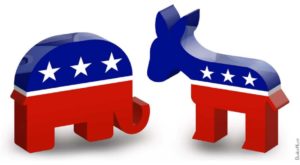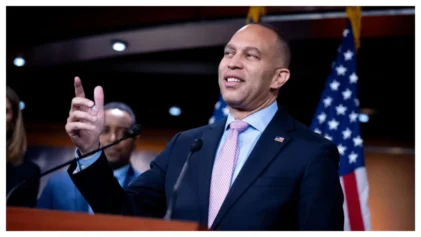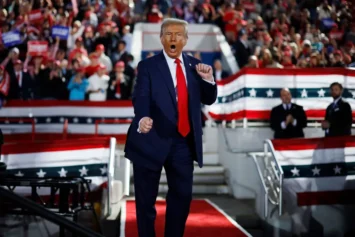
(Photo: Flickr)Mi5red
America’s two major parties are experiencing an existential crisis. The election of Donald Trump has exposed internal rifts within both the Republican and Democratic parties, and conflicts over ideology and philosophy. Neither party has unified its factions, speaking with one voice or moving in one direction.
On the Republican side, Trump came into office on a wave of white nationalism fueled by economic anxiety, resentment over immigration, and the politics of white grievance and a fear of being overrun by Black and Brown people. Nine months in office, Trump is suffering from record-low job approval, with a 39 percent average positive rating and a 56.1 percent negative rating, according to a composite of polls from Real Clear Politics. Although the GOP has control of the executive branch — with the ability to shape the federal judiciary and stack the courts — both houses of Congress and 26 state houses, President Trump has been unable to pass major legislation such as efforts to repeal and replace Obamacare. Further, he is undermining his own push to enact tax cuts.
As Trump moves to take control of the Republican Party as a vehicle for his self-aggrandizement and devoid of a set of core beliefs, a divide has grown between the corporate establishment conservatives in the mold of Sen. Mitch McConnell (R-KY), Sen. John McCain (R-AZ) and House Speaker Paul Ryan (R-WI) — and the white nationalist wing of the GOP, as represented by former Trump adviser and Breitbart chief Steve Bannon, and Trump himself.
Voices from the establishment wing have spoken out against their own president. In a speech at the National Constitution Center in Philadelphia, where he received the Liberty Medal, McCain warned the United States is moving toward “half-baked, spurious nationalism cooked up by people who would rather find scapegoats than solve problems,” and characterized this nationalism as “unpatriotic as an attachment to any other tired dogma of the past that Americans consigned to the ash heap of history.” Referring to Trump wing of the party without naming names, the senator said these nationalists seek to “abandon the ideals we have advanced around the globe” and “refuse the obligations of international leadership.”
Former President George W. Bush also decried Trumpism without actually naming the president. Denouncing nationalism and the “casual cruelty” in the public discourse, and the role of bullying and bigotry in national politics. “We’ve seen nationalism distorted into nativism, forgotten the dynamism that immigration has always brought to America,” Bush said. “We see a fading confidence in the value of free markets and international trade, forgetting that conflict, instability and poverty follow in the wake of protectionism. We’ve seen the return of isolationist sentiments, forgetting that American security is directly threatened by the chaos and despair of distant places.”
Senator Bob Corker (R-TN) has found himself in a feud with Trump, calling the president “untruthful” and accusing him of “debasing” the country. Things came to a head when Sen. Jeff Flake (R-AZ) gave a speech on the Senate floor, announcing his retirement and characterizing Trump as a threat to democracy like McCarthyism. “We face just such a time now. We have again forgotten who we are supposed to be,” Flake said. “There is a sickness in our system — and it is contagious.”
However, Flake joined other Republicans in blocking a consumer protection rule allowing customers to file class action lawsuits against big business.
Trump says the party is united, as he seeks a consolidation and ownership of the mainstream of the Republican party, with mainstream defined as a politician’s loyalty and support for Trump. Sen. Jim Inhofe (R-OK) suggested that those Republicans who do not support Trump should leave office.
Just asked Sen. Jim Inhofe, R-Okla., about the Flake-Corker criticisms of Trump. He had this to say: pic.twitter.com/oI2RpXYP5w
— Erica Werner (@ericawerner) October 25, 2017
With the financial backing of billionaire Robert Mercer, Steve Bannon is fashioning himself as a kingmaker, with plans to back candidates to challenge all GOP incumbents in the Senate except for Ted Cruz of Texas. Fresh off the win of Christian extremist and former Alabama Supreme Court chief justice Roy Moore in the Alabama Republican primary race for the U.S. Senate, Bannon wants to blow up the Republican Party.
The Democratic unity against Trump and his policies belies the internal warfare taking place in the party, which should be poised to benefit from Republican strife. The lines of demarcation in the party separate the progressive Bernie Sanders wing from the corporate/moderate wing once controlled by President Obama and Hillary Clinton.
Newly minted DNC Chair Tom Perez, the choice of the corporate wing, has been unable to energize voters. Money to the party is drying up, as some donors refuse to continue funding the DNC for failure to release a 2016 autopsy report assessing Democrats’ election loss. This DNC fundraising slump stands in marked contrast to Democratic candidates, as Salon reported. The Democratic Congressional Campaign Committee and the Democratic Senatorial Campaign Committee, which raise money for Democratic candidates in the House and Senate, respectively, are bringing in more cash than their GOP counterparts.
As Perez faces criticism over his leadership amid concerns he cannot get the job done, he is staging a purge of loyalists to Bernie Sanders and DNC vice chair and Congressman Keith Ellison. As The Intercept noted, Perez has removed DNC members who are supportive of the Black lawmaker, placing Ellison in the unenviable position of appearing to be an apologist for a party he is unable to steer n a progressive direction. Further, Perez has selected corporate lobbyists to replace progressive party members, including “influence peddlers” for the News Corporation, the parent company of Fox News (Joanne Dowdell), the coal industry, big banks and tobacco companies (Jaime Harrison), Citigroup (Manny Ortiz), subprime mortgage lenders and lobbyists who sought to eliminate parts of Obamacare (Clinton supporters Maria Cardona and Minyon Moore).
The DNC has failed to divest itself of its superdelegate system, which, according to critics, gives party insiders and elected officials undue influence and power over the primary process, subverting the efforts of progressive candidates such as Sanders. These corporate lobbyists will serve as superdelegates as well as at-large delegates. Corporate Wall Street Democrats in the mold of Bill Clinton’s Democratic Leadership Council argue, without substantiating their claim, that Democrats lost in 2016 due to populism and a “lurch to the left” on the part of Clinton that supposedly cost the candidate “white working class” voters in key Midwest battleground states.
Almost a year after the election, Democrats continue to face criticism for ignoring their base — Black voters, particularly Black women, are its most loyal segment of the base — in favor of chasing the elusive white working-class Trump voter. This dynamic is playing out in the Virginia gubernatorial race, where Democrat Ralph Northam could conceivably win against Ed Gillespie without a single white vote — although Democrats have many reliable white voters — yet threatens to lose it all by failing to invest resources in mobilizing Black voter turnout. Many progressive and Democratic institutions are still white dominated, as The Nation notes, with implicit bias by whites who undervalue Black voters threatening Democratic party political wins. Meanwhile, the problem of diversity at the DNC, in a party which touts its perceived inclusion, was brought into the spotlight in a photo of DNC interns:
Looks like the Democratic National Convention has an ethnic diversity problem in their own internship program.
Democrats STAY losing. pic.twitter.com/CNgagoCwP9
— Shaun King (@ShaunKing) October 24, 2017
“The Democratic Party will only succeed in stopping Trump and the Republicans in Congress if it is a boldly progressive, multiracial, populist party. So it’s troubling to see the DNC seem to purge people from its leadership simply because they supported the progressive candidacy of Keith Ellison for chair,” Joe Dinkin, spokesman for the Working Families Party told The Intercept. “For the sake of the nation, the DNC should reverse course, spend less time courting big donors, and more time bringing progressives voices into the party, instead of silencing them.”
This fight for the souls of these respective major parties comes as Democrats and Republicans are more ideologically divided than in the past.
Disunity within the major parties, and a failure to meet the needs of voters provides opportunities for a transformation of the political process. If the Democratic Party chooses to favor corporate interests and reject a commitment to working people and racial and economic justice, while the Republican Party stands for nothing more than extremism, instability and maintaining power and profit without adhering to core principles, this could lead to a splintering of the two parties. One can envision the old parties forced to compete with a center-right party and a progressive-left party, or otherwise fading into oblivion and rendered irrelevant. Although the process by which the American system of government reforms itself may provide volatile, a system that is more responsive to the needs of its people will bring more stability and effectiveness.


